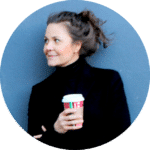In this week’s blog, my apprentice turned colleague Maggie Gilewicz (PhD) shares from an upcoming book some thoughts on how understanding the inside-out nature of our personal reality fundamentally challenged and changed the way she lives in and makes sense of the world.
“The path to enlightenment with the gurus, spiritual promises, and self-help books is like a Big Mac. Although it might feel good consuming it in the moment, it does not truly nourish us and, half an hour later, we are hungry again and looking for more. “
Seph Fontane Pennock
I remember times in my life when I would reach out for self-help books whenever I felt low, anxious, insecure or lost. I remember how I felt in those moments and how I was desperately looking for something so I could change how I felt. And, that’s because at the time I was afraid of what I was feeling. I would freak out every time I felt depressed, or anxious. What I also remember is, whenever I was experiencing those feelings, I thought there was something wrong with me, particularly when it seemed to me it was either happening too often or it lasted far too long. And, I believed something in my life—my work, my relationship, where I lived—had to change so I could feel better, or that something (a strategy, tool, practice, self-help book, seminar) or someone (a coach, guru, therapist) could change how I felt.
I also remember that by the time I got to read a self-help book, I was so caught up in thinking—I was so invested in trying to change how I felt—that all I saw when I was reading it were words, but no meaning. Sometimes, I would find the content inspiring and, for a moment, I felt better and ready to use the tools or strategies I found in many of those books. But this feeling would never last and, sooner or later, I’d give up on the tools and the strategies too. So, I’d look for another book. And every time I opened another and then another, I hoped that “that” book might finally turn out to be “the one” that would change my life. More importantly, it would help me change how I felt.
However, whatever I read and whatever advice I followed, sooner or later, I’d be back to feeling like crap again. Often, I’d feel worse because now I’d think of myself as a lost cause. How I felt still sucked, and because of it, my life sucked too.
I found myself in this loop a few times throughout my life. At the time, I thought I should not feel uncomfortable, anxious, or insecure; that I should never feel lost or stuck. So, I was constantly trying to change. Change how I felt or change myself. I was chasing after the illusive “positive state” or “happiness” because, I thought, it was possible for those states to be permanent. And, a lot of self-help books and advice I came across, innocently perpetuated the idea that I should feel good all the time, that I should be “productive,” or happy, or on top of the game, confident, in control, etc. most of the time. And if I didn’t, it was a problem. So, I should find out what the problem was and try to solve it. At the very least, there was always something I should be better at, something I should fix or improve about myself, which meant, that I was not OK or not enough the way I was. The search for tools, strategies, and practices continued because all the books I read seemed to convey the idea that I would have to forever rely on what they taught, as opposed to my own inner wisdom.
Thankfully, a few years ago I experienced what some people describe as an “insight,” an “aha’ moment, or “epiphany’. I saw my life and myself in a completely different way, and for the first time in my life, I experienced a sense of well-being like I never thought possible. All the problems I had before that moment happened were still there, but they no longer looked “problematic.” I understood, on a deeper level, how our experience of life is created and how and why we feel one way or another about other people or our circumstances.
But, what made the biggest difference to me was the realization that I did not have to be afraid of my thoughts. And, if I did not have to be afraid of my thoughts, I did not have to be afraid of my feelings and emotions. So, I stopped fighting my feelings, trying to get rid of them, and I stopped trying to change my thoughts. For the first time, I felt a huge sense of relief and I felt the freedom to be fully myself. Freedom to feel good and freedom to feel bad. Freedom to feel courageous and the freedom to be scared. Freedom to feel anxious and freedom to feel at peace. Freedom to be human. Ever since my epiphany, I have been able to be OK even when I don’t feel OK and, because of that, I have been able to experience well-being and enjoy my life much more, and more often.
I wrote this book because I wish someone had told me much, much earlier, what I now know: deep down, I have always been OK with all my thoughts and all my feelings. I may not have understood that straight away, but I would get curious enough to try to understand that and see it for myself. I wish that someone had told me that the more I try to change, manipulate, resist, or get rid of “bad” feelings, the longer they will persist.
I wish someone told me that whenever I felt I was not enough or not OK, it was because I learned somewhere that I should never feel bad. That I should be wiser, different, more positive, or more enlightened. That every time I wasn’t feeling OK, it was not because there was something inherently wrong with me, but because my own wisdom and my natural OK-ness, got lost not only in the ocean of other people’s opinions, ideas, and concepts, but also in the ocean of my own thoughts about who I should be, what I should be doing, and how I should be doing it.
I wish someone had told me that I have always had everything already within me to deal with the ups and downs of life, and all I needed was someone to help me see that for myself. I wish someone had told me that my intuitive hunches, the “aha moments” and “gut feelings”—even though they cannot be measured or rationally explained—matter and are an intrinsic part of my intelligence. I wish I had known that, before I set new goals and make choices, I should consult my inner self first—before I consult or listen to anyone else, whether they are my friends, my parents, gurus, or experts because only I know who I truly am and what I truly desire.
I wish I had known that nothing on the outside can change how I feel on the inside. That no amount of money, a better career, a nicer house, different circumstances, have anything to do with my contentment and well-being. Those things may bring a temporary sense of satisfaction, a bit of fun and excitement, but none of those feelings will last because a true sense of happiness and well-being can only come from within. I wish I had known that it is not life, people, or my circumstances that create my feelings, but that my thoughts create my feelings about my life, the people in it, and my circumstances. Knowing this, I would be less consumed by trying to change my outer world, and more interested in exploring my inner world.
So instead of giving you more tools, strategies, and techniques to follow, what I want to offer you are some of the insights and knowledge I have gained that changed for the better the way I see my life and myself. I really hope that you find in this book something that will be helpful to you; that there will be a chapter, a paragraph, or a sentence that will resonate with you on a deeper level.
I have no way of knowing if what I say in this book will have some kind of impact on you because I am not in control of that. But, what I do quietly wish for is that you’ll be left with a feeling: a good feeling, about yourself and about your life. And, I hope you’ll get curious about it and you will turn your attention inwards and explore that feeling.
About Dr Maggie Gilewicz
 Dr. Maggie Gilewicz aka Dr. Maggie G. educationally is a sociologist and political scientist. Professionally she is a Transformational Coach. Naturally, she is a rebel (in the most positive sense). After many years spent in academia, both as a student and as a teacher, she came to a realization that while schools, colleges, are preparing young people for a degree or an occupation, there’s virtually nothing in their curricula that would prepare these young people for life after graduation. This needs to change and through writing about it, teaching and speaking, she is on a mission to change that. She’s currently working on her first book “How To Make Sure Your Life Doesn’t Suck: A Different Kind Of Guide To Navigating The Ups And Downs Of Life” and it will be available soon. Otherwise, she loves to read and to travel. She enjoys good food and always has a need to sing songs of Ella Fitzgerald after a glass of wine or two. www.drmaggieg.com
Dr. Maggie Gilewicz aka Dr. Maggie G. educationally is a sociologist and political scientist. Professionally she is a Transformational Coach. Naturally, she is a rebel (in the most positive sense). After many years spent in academia, both as a student and as a teacher, she came to a realization that while schools, colleges, are preparing young people for a degree or an occupation, there’s virtually nothing in their curricula that would prepare these young people for life after graduation. This needs to change and through writing about it, teaching and speaking, she is on a mission to change that. She’s currently working on her first book “How To Make Sure Your Life Doesn’t Suck: A Different Kind Of Guide To Navigating The Ups And Downs Of Life” and it will be available soon. Otherwise, she loves to read and to travel. She enjoys good food and always has a need to sing songs of Ella Fitzgerald after a glass of wine or two. www.drmaggieg.com






